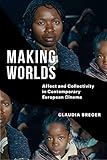Making Worlds : Affect and Collectivity in Contemporary European Cinema / Claudia Breger.
Material type: TextPublisher: New York, NY : Columbia University Press, [2020]Copyright date: ©2020Description: 1 online resource : 23 b&w frame stillsContent type:
TextPublisher: New York, NY : Columbia University Press, [2020]Copyright date: ©2020Description: 1 online resource : 23 b&w frame stillsContent type: - 9780231194181
- 9780231550697
- Affect (Psychology) in motion pictures
- Motion pictures -- Aesthetics
- Motion pictures -- Political aspects -- Europe -- History -- 21st century
- Motion pictures -- Political aspects -- Europe
- Motion pictures -- Social aspects -- Europe -- History -- 21st century
- Motion pictures -- Social aspects -- Europe
- PERFORMING ARTS / Film & Video / History & Criticism
- 791.43/658 23
- online - DeGruyter
| Item type | Current library | Call number | URL | Status | Notes | Barcode | |
|---|---|---|---|---|---|---|---|
 eBook
eBook
|
Biblioteca "Angelicum" Pont. Univ. S.Tommaso d'Aquino Nuvola online | online - DeGruyter (Browse shelf(Opens below)) | Online access | Not for loan (Accesso limitato) | Accesso per gli utenti autorizzati / Access for authorized users | (dgr)9780231550697 |
Frontmatter -- Contents -- Introduction -- CHAPTER ONE. Affects in Configuration -- CHAPTER TWO. Critical Intensity -- CHAPTER THREE. Genre Assemblages -- CHAPTER FOUR. Tenderly Cruel Realisms -- Epilogue:Reconfiguring Resistance -- Acknowledgments -- Notes -- Bibliography -- Index
restricted access online access with authorization star
http://purl.org/coar/access_right/c_16ec
The twenty-first century has witnessed a resurgence of economic inequality, racial exclusion, and political hatred, causing questions of collective identity and belonging to assume new urgency. In Making Worlds, Claudia Breger argues that contemporary European cinema provides ways of thinking about and feeling collectivity that can challenge these political trends.Breger offers nuanced readings of major contemporary films such as Michael Haneke’s The White Ribbon, Alejandro González Iñárritu’s Biutiful, Fatih Akın’s The Edge of Heaven, Asghar Farhadi’s A Separation, and Aki Kaurismäki’s refugee trilogy, as well as works by Jean-Luc Godard and Rainer Werner Fassbinder. Through a new model of cinematic worldmaking, Breger examines the ways in which these works produce unexpected and destabilizing affects that invite viewers to imagine new connections among individuals or groups. These films and their depictions of refugees, immigrants, and communities do not simply counter dominant political imaginaries of hate and fear with calls for empathy or solidarity. Instead, they produce layered sensibilities that offer the potential for greater openness to others’ present, past, and future claims. Drawing on the work of Latour, Deleuze, and Rancière, Breger engages questions of genre and realism along with the legacies of cinematic modernism. Offering a rich account of contemporary film, Making Worlds theorizes the cinematic creation of imaginative spaces in order to find new ways of responding to political hatred.
Mode of access: Internet via World Wide Web.
In English.
Description based on online resource; title from PDF title page (publisher's Web site, viewed 27. Jan 2023)


